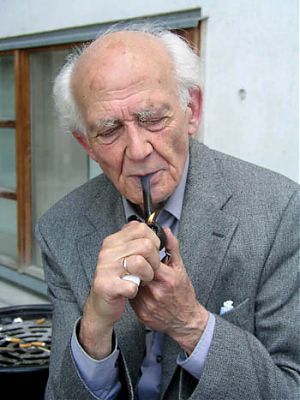The interest it has in the framework of social education, we rescued today an article written by José López Ponce on the conference that Zygmunt Bauman held in November 2008 during his visit to the city of Barcelona.
Source: Rhizomatic. By José López Ponce (28/11/2008)

Education in a world of diasporas, is the title of the lecture given by Zygmunt Bauman in Barcelona, a week ago, in the framework of the Debates on Education, organized jointly by the Fundació Jaume Bofill and the Universitat Oberta de Catalunya. A splendid lecture of a man seemingly fragile physically for his age, but with a powerful mind that was connected concepts as if it were a jazz session.
Bauman is a sociologist of 83 years in which you have analyzed and are analyzing, with clarity, the transformations of our world and the transit of a solid modernity, which is grounded in the stability and monotony, to a liquid modernity where it is imposed by the fickle and diversity, where social structures no longer endure the time necessary to solidify and, therefore, we’re running out of patterns of reference for our human acts.
Bauman is an advocate of the hope versus optimism. Have hope in reason and the human conscience, decency. According to him, the humanity has been many times in crisis, but have always resolved the problems, the only real concern is how many victims will fall before. Your thinking is rigorous and, at the same time, entertaining, observes and analyzes, but does not seek definitive answers, because they do not exist.
In my opinion, to understand the current crisis in which we are immersed, there is recourse to Bauman, because the uncertainty in which we live is due to all of these transformations of our world. For example, in the conference, in the round of questions, he told us that we are immersed in a globalization bad, the good is coming. Globalization is bad because the power has been globalized (financial, terrorism, mafias) but politics remains local and may not provide comprehensive responses for this separation between power and policy.
Returning to his conference on education in a world of diaspora, he developed three basic ideas. Summarize what you capture of Bauman and, therefore, is not a literal transcription of his words.
The first idea focused on the concept of diaspora, a social model of assimilation and adaptation that leads us to live permanently with the difference. A model that is the antithesis of the model of integration/assimilation, “the convert or die of the conquistadors” of modernity precedent. Diaspora that brings us to a transition of the model that leads to the world unprecedented in scale. A world where loyalties can be dual, even multiple, that makes it difficult to discern the membership and that leads to a fight and a permanent negotiation for the recognition of the own identity as an individual. A model that implies the replacement of roots by the anchor that allows us to be anchored in a “port”, but, at any time, we weigh anchor and take us back to another port.
The second idea addressed the concept of culture in liquid modernity. A current model based on individual choices that are driven by the seduction, desires, and public relations. A model that is opposed to the concept of a culture of standards based on the production by an elite of knowledge and the arts that must be cultivated for the rest of the people. Today there are to seduce the other, the “customers” and the culture, in this context, it is as a kind of basic product for this process of seduction. In addition, with the diaspora, there is a variety of options in the choice of cultural and this collides with the idea of cultural integration, a crucial aspect because it challenges any model of education based on a unique pattern.
Finally, the third idea was about the communication between the generations. At this point, Bauman points to the ambivalence of a world online (virtualized) and an offline world (real), with different rules. For Bauman, in the virtualized world is the possibility of recreating new identities, for example SecondLife, and live in a world of multiple identities. Other of the features is the speed with which it all takes place devaluing the concept of long-term and constant reinvention.
These aspects of the online world, it transforms concepts of community and relationship, fades the commitment. Why?: Because online social networks are based on frequency and intensity of involvement of individuals who can, at the same time, be present in different networks without generating conflicts. And because they have the key “Delete” which allows you to break out of, without effort, any link with any individual or community. And these features of the virtual world along with the attraction for the ease of breaking of relations and commitments are carried over into the real world, questioning the concepts solidly settled community and relationship, but with the setback of that in the real world there is no such key and, therefore, the processes of rupture are more cumbersome with a great emotional charge in the relationship face-to-face.
When the Internet began to socialize Bauman already had more than 70 years and, without being a geek, is one of the thinkers who has best understood the component of socialization that involves the Network and the impact on our lives, as individuals and as social beings.
